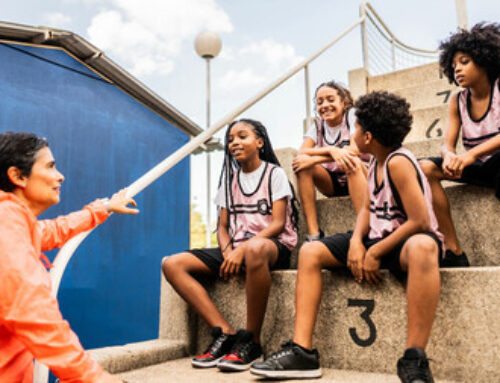5 Ways to Avoid Blowing Your Scholarship and Ruining Your Life on Social Media
Here are two facts you need to remember at all times: First, tweets live forever and can be seen by everyone in the world. The same is true for all of your posts to Instagram, Snapchat (hahaha if you thought that these actually disappeared), and TickToc
Second thing you should know: You can’t possibly know all of the people who are following you. This is especially true if you’re an athlete who’s even remotely noteworthy; and given the norms of college recruiting today—when fans lobby teenagers to attend their favorite schools through online messages—you’re probably more noteworthy than you think.
So though it’s not totally fair to say this, the reality is that if you’re on social media, you need to play it smart and start thinking of yourself as a brand. The things you say and do online will affect the health of your brand—i.e., your options at the next level.
Here are five tips to make sure your social media is helping—not hampering—your personal “brand” reputation.
1. Don’t Post (or even RT) Anything You Wouldn’t Want a Coach to See

Want proof that you’re under a microscope? Check out this tweet from SMU defensive coordinator Van Malone:
We have a team of people who monitor what recruits are putting on social media. Watch what you tweet and retweet. pic.twitter.com/MNjrwSbuEd
— SMU Coach Van Malone (@SMUCoachMalone) September 16, 2015
As you can see, his team doesn’t look only at what athletes are saying. SMU’s media monitors also read the content you retweet or share.
If you don’t want college coaches to read or see it, don’t post or RT it. Even if your account is locked, followers can (and will) screenshot the things you think you’re keeping private. Post something controversial, and some hater somewhere will gleefully share your regrettable words with the world.
This is not to say you can’t have fun. Feel free to crack jokes or make fire memes. There’s nothing wrong with showing your personality. Just err on the side of positivity rather than negativity.
2. Don’t Lose Like a Loser

Everyone loses games from time to time. Coaches know that. If your team ends up on the wrong end of the score, they want to see how you handle it. What they won’t want to see is you firing off an expletive-filled message attempting to belittle your opponent.
When you lose, do one of two things: 1) say nothing, or 2) give the other team credit and move on.
Maturity goes a long way toward showing college coaches that you’re ready for the responsibility of playing at the next level.
3. Interact with Your Teammates

Congratulate your teammates when they get a college offer or have a big game. This will not only foster better chemistry within your own team, but it will show college coaches that you’re the type of teammate others will like having in the locker room.
4. Share Your Life Outside Sports

Don’t think that just because college coaches are monitoring your social media that you can’t share your life outside sports. Did you get a good grade on that math test? Don’t be afraid to do a little bragging on Twitter. Are you in the school band or do you participate in any clubs? Let’s hear about that, too. There’s nothing wrong with being well-rounded.
5. Don’t Be Afraid to Show Off
Did you have a big game last week? Share your highlights. Pull off a new PR in the weight room? Throw that clip up on Instagram. Social media can be a great way to increase your exposure to college coaches, so don’t be afraid to show off a little. It’s also a good idea to publicize any camps or showcases you’ll be attending so coaches can keep tabs on you.
Bonus Q: What Can College Coaches Do on Social Media?
With the explosion of social media, the NCAA has been forced to get involved with how coaches and recruits interact with each other on these platforms. Coaches cannot tweet directly at you, but they can follow and private message (or DM) you.
And thanks to a new rule passed this off-season, coaches can now also like, favorite, tag, retweet or republish posts from high school athletes.
While this might sound like big fun (“Hey look! Charlie Strong RT’d me!”), it can have surprising results. (“Why am I getting all of these threats from people in Oklahoma?”)
If you ever feel harassed by a member of a certain fan base, use the block button liberally.
RECOMMENDED FOR YOU
MOST POPULAR
5 Ways to Avoid Blowing Your Scholarship and Ruining Your Life on Social Media
Here are two facts you need to remember at all times: First, tweets live forever and can be seen by everyone in the world. The same is true for all of your posts to Instagram, Snapchat (hahaha if you thought that these actually disappeared), and TickToc
Second thing you should know: You can’t possibly know all of the people who are following you. This is especially true if you’re an athlete who’s even remotely noteworthy; and given the norms of college recruiting today—when fans lobby teenagers to attend their favorite schools through online messages—you’re probably more noteworthy than you think.
So though it’s not totally fair to say this, the reality is that if you’re on social media, you need to play it smart and start thinking of yourself as a brand. The things you say and do online will affect the health of your brand—i.e., your options at the next level.
Here are five tips to make sure your social media is helping—not hampering—your personal “brand” reputation.
1. Don’t Post (or even RT) Anything You Wouldn’t Want a Coach to See

Want proof that you’re under a microscope? Check out this tweet from SMU defensive coordinator Van Malone:
We have a team of people who monitor what recruits are putting on social media. Watch what you tweet and retweet. pic.twitter.com/MNjrwSbuEd
— SMU Coach Van Malone (@SMUCoachMalone) September 16, 2015
As you can see, his team doesn’t look only at what athletes are saying. SMU’s media monitors also read the content you retweet or share.
If you don’t want college coaches to read or see it, don’t post or RT it. Even if your account is locked, followers can (and will) screenshot the things you think you’re keeping private. Post something controversial, and some hater somewhere will gleefully share your regrettable words with the world.
This is not to say you can’t have fun. Feel free to crack jokes or make fire memes. There’s nothing wrong with showing your personality. Just err on the side of positivity rather than negativity.
2. Don’t Lose Like a Loser

Everyone loses games from time to time. Coaches know that. If your team ends up on the wrong end of the score, they want to see how you handle it. What they won’t want to see is you firing off an expletive-filled message attempting to belittle your opponent.
When you lose, do one of two things: 1) say nothing, or 2) give the other team credit and move on.
Maturity goes a long way toward showing college coaches that you’re ready for the responsibility of playing at the next level.
3. Interact with Your Teammates

Congratulate your teammates when they get a college offer or have a big game. This will not only foster better chemistry within your own team, but it will show college coaches that you’re the type of teammate others will like having in the locker room.
4. Share Your Life Outside Sports

Don’t think that just because college coaches are monitoring your social media that you can’t share your life outside sports. Did you get a good grade on that math test? Don’t be afraid to do a little bragging on Twitter. Are you in the school band or do you participate in any clubs? Let’s hear about that, too. There’s nothing wrong with being well-rounded.
5. Don’t Be Afraid to Show Off
Did you have a big game last week? Share your highlights. Pull off a new PR in the weight room? Throw that clip up on Instagram. Social media can be a great way to increase your exposure to college coaches, so don’t be afraid to show off a little. It’s also a good idea to publicize any camps or showcases you’ll be attending so coaches can keep tabs on you.
Bonus Q: What Can College Coaches Do on Social Media?
With the explosion of social media, the NCAA has been forced to get involved with how coaches and recruits interact with each other on these platforms. Coaches cannot tweet directly at you, but they can follow and private message (or DM) you.
And thanks to a new rule passed this off-season, coaches can now also like, favorite, tag, retweet or republish posts from high school athletes.
While this might sound like big fun (“Hey look! Charlie Strong RT’d me!”), it can have surprising results. (“Why am I getting all of these threats from people in Oklahoma?”)
If you ever feel harassed by a member of a certain fan base, use the block button liberally.
RECOMMENDED FOR YOU
Create A Free Recruiting Profile Today!
CaptainU helps athletes & parents not only be proactive but also to manage and take control of their entire recruiting journey.










